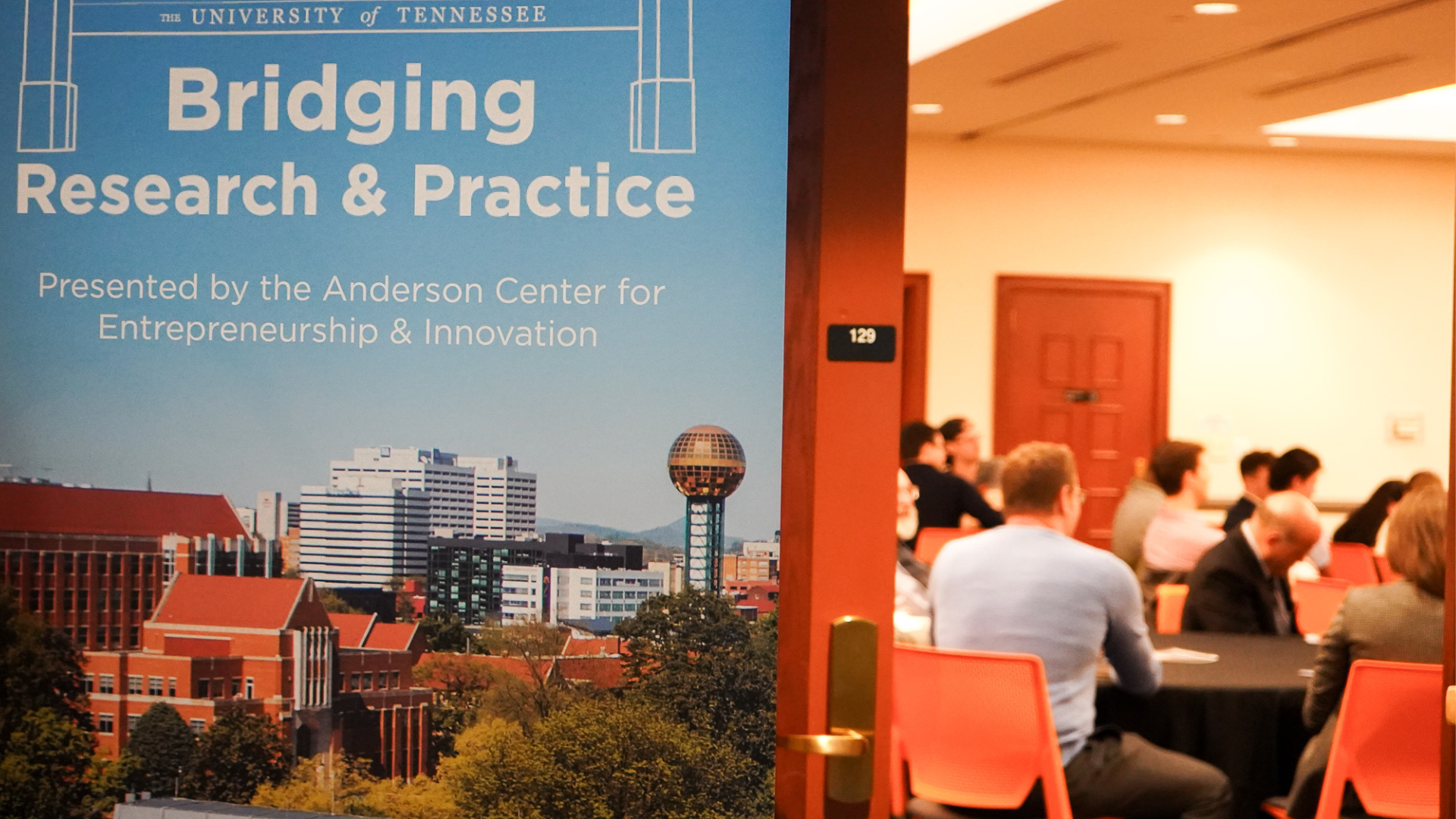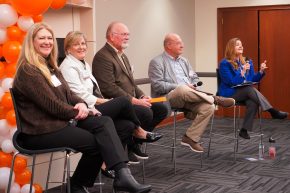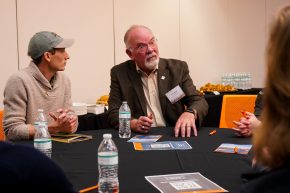
Students learn how to mitigate the risks of entrepreneurship
The panel of experts discussed the biggest risks each entrepreneur took on their journey, and what was the best way to mitigate those risks.
Over 60 students filled the room at the UT Creamery for the twice-annual Bridging Research and Practice event through the Anderson Center for Entrepreneurship and Innovation (ACEI). The educational event featured a panel discussion with four respected people in Knoxville’s entrepreneurial ecosystem, followed by roundtable discussions between students and the panelists.

Melissa Cardon, a Distinguished Professor of Entrepreneurship at the University of Tennessee, Knoxville (UTK) Haslam College of Business moderated the panel.
She welcomed John Bruck, who founded and successfully exited two entrepreneurial start-ups, including BHE Environmental, Inc. which made it onto Inc. Magazine’s “Inc. 500 list” #98 for fastest growing companies. He is also the Co-Founder and Lead Advisor of the Spark Innovation Center at UT Research Park, formerly holding the Director role.
Cardon also welcomed Brian Krumm, an Associate Professor of Law at UTK. He served as the Assistant Commissioner of Employment Security, Deputy Commissioner of Labor, and as a policy advisor to the Governor. His career has been focused on representing small and medium-sized businesses on matters of corporate governance.
Next to Krumm sat Misty Mayes, the Founder and Chief Executive Officer (CEO) of Management Solutions LLC., a consulting firm specializing in project strategy, clean energy program management, facilities and administrative management, and human capital transformation. She has more than 30 years of experience in energy and national defense, and 30 years of experience leading a thriving company. Her company has been recognized several times as one of the U.S. Chamber’s Top 100 Small Businesses.
Completing the panel is Associate Professor of Practice and Rocky Top Institute Director, Myra Loveday. She is also the Director of Retail Strategies for the UT Creamery. The concept was a nostalgic revamp of the former UT Creamery which served students, faculty, and community members from 1915 to 1985. Loveday helps oversee operations, which are almost entirely run by UTK students.
Cardon kicked off the panel by asking about the biggest risks each entrepreneur took on their journey, and what is the best way to mitigate those risks. The responses covered a broad spectrum.

Bruck explained that sometimes the toughest part is knowing when to say yes or no to opportunities. For example, his company BHE Environmental had the opportunity to open an office in California. He felt cautious due to the nature of the non-invested, non-committed workforce in the area. He didn’t open the office. To this day, Bruck wonders if that was the right decision for his company.
Mayes said her biggest risk was the hiring of new people. Early-stage start-ups deeply depend on the people you hire. She took a risk on every person she hired and took on additional risk by bringing family members into her business structure.
While Krumm has not been a founder, he has mitigated many business disagreements. His greatest advice to young entrepreneurs is to eliminate the risk of having a co-founder. Some partnerships work out, but solo entrepreneurs are more likely to be successful.
“If you do decide to have a co-founder, then before you officially create the business entity, you should draft up a founder’s agreement to make sure everyone is on the same page,” he said. “That way if things go south, you have things in writing.”
A student in the audience asked what advice each of the advisors could offer, given their personal experiences.
Loveday said the greatest advice is to have a personal board of directors for yourself.
“You need a personal support system for yourself to help you regulate on the bad days, because in entrepreneurship there will be plenty of bad days. You need people in your corner who love you, who you trust, and who can challenge you,” she said.

Krumm emphasized the same thing and added that the board of directors for an early-stage start-up is critically important, too.
“You need someone who is going to push back, make you slow down, and deeply think about your decisions,” Krumm said. “You need someone on your board or in your counsel to ask you about why you are making the decisions you are making.”
Building on the prior points, Bruck and Mayes chimed in to share that your three best friends in the first few years of starting a business will become your lawyer, banker, and accountant – and the three should talk.
“These are going to be the people that help you mitigate risk and keep you on the track to succeed,” Mayes said.
“You need to listen to your counsel. They want your long-term business, so they are going to give you good advice to keep yourself out of trouble. You should take that advice,” Bruck said. “But you also need to listen to your customers, since they are the ones who will drive your sales and success, and you need to listen to yourself.”
Following the panel, students split off into four groups to chat about mitigating risks in business. For more information about the community events offered by ACEI, check out their website.
Like what you've read?
Forward to a friend!

